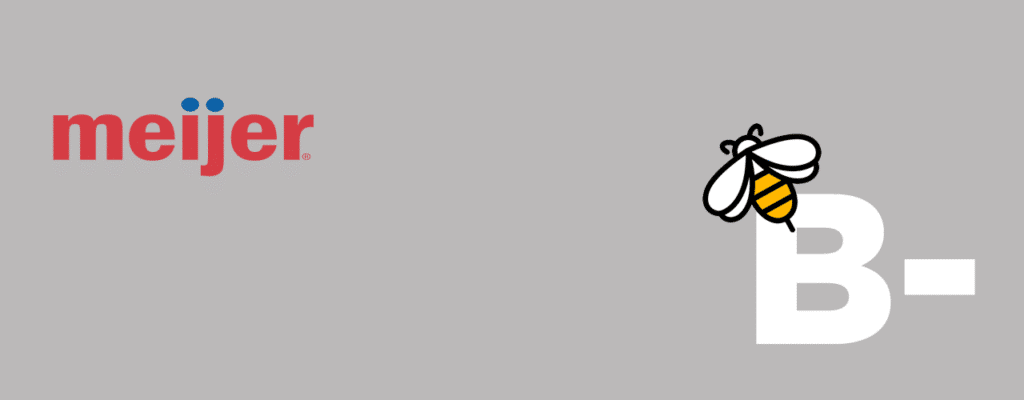
Meijer
Summary of Meijer grade

Pollinator Health Policy
26 out of 45 points
In December 2024, Meijer released a new publicly available policy, updating its original policy from 2021. The policy requires all fresh produce suppliers to adopt Integrated Pest Management (IPM) programs, verified by a list of third-party certifications, by January 2030.The policy also encourages fresh produce suppliers to minimize the use of nitroguanidine neonicotinoids and organophosphates and to avoid regrettable substitution and includes a link to a list of pollinator-toxic pesticides to avoid. The policy also states that Meijer will continue to grow USDA organic produce sales. Meijer also states that the company will work with academic institutions to develop educational opportunities for suppliers to learn how to develop and implement IPM strategies and other forms of least-toxic approaches to pesticide use. Finally, the policy states that Meijer has eliminated the use of neonicotinoids from live plants sold in its stores and garden centers.
Meijer’s policy does not include any timebound or measurable commitments to phase out pesticides of concern.
Commitment to reduce pesticide use
6 out of 15 points
Avoiding regrettable substitutes
5 out of 5 points
Commitment to least-toxic approaches in non-organic supply chains
10 out of 10 points
Commitment to organic
5 out of 15 points

Implementation
25.5 out of 90 points
Meijer’s pollinator health policy includes a timebound commitment for all fresh produce suppliers to adopt ecological farming methods called Integrated Pest Management (IPM), as verified by a vetted list of third-party certifiers, by January 2030. Accepted certifications with meaningful IPM criteria are: Regenerative Organic Certified, USDA Organic & international equivalents, Bee Better Certified, LEAF MARQUE, Biodynamic, GLOBAL G.A.P. (Integrated Farm Assurance) Certified Sustainably Grown, Rainforest Alliance, Equitable Food Initiative (IPM/ Pest Management Standards), Fair Trade International, Fair Trade USA, and Sustainable Food Group Sustainability Standard. Meijer’s policy also encourages fresh produce suppliers to minimize the use of nitroguanidine neonicotinoids and organophosphates and to avoid regrettable substitution and includes a link to a list of pollinator-toxic pesticides to avoid. Meijer communicated to Friends of the Earth that over 10% of produce sales are certified USDA organic.
Meijer has not measurably reduced pesticide use in the past three years. The company has not demonstrated support for U.S. growers to transition to organic farming nor demonstrated advocacy for public policies aimed at reducing agricultural pesticide use, protecting pollinators, or supporting the expansion of organic agriculture in the U.S.
Track pesticide use in supply chain
3 out of 10 points
Measurably reduce pesticide use
0 out of 15 points
Prioritize least-toxic approaches in non-organic supply chains
20 out of 20 points
Prioritize USDA certified organic
2.5 out of 25 points
Support domestic organic growers
0 out of 15 points
Support public policies
0 out of 5 points

Transparency & Accountability
16 out of 21 points
Meijer’s pollinator health policy is publicly available on the company’s website. The policy requires fresh produce suppliers to adopt Integrated Pest Management by January 2030, verified by a list of third-party certifications. It also encourages produce suppliers to transition away from nitroguanidine neonicotinoids and organophosphates and states Meijer’s aspiration to expand organic offerings. Meijer’s website educates consumers about the value of decreasing use of pesticides to protect pollinator health and the benefits of the USDA certified organic label.
Meijer does not appear to include reduction of pesticides of concern to pollinators and human health or expansion of organic offerings in company Key Performance Indicators or other formal sustainability criteria.
Make policies and commitments publicly available
6 out of 6 points
Oversight
0 out of 5 points
Educate consumers
10 out of 10 points

Collaboration
10 out of 10 points
Meijer has communicated with Friends of the Earth in the past year and has briefed Friends of the Earth on meaningful action the company has taken on pesticides and pollinator protection in the past three years.

Complimentary Home & Garden Policies
4 out of 9 points
Meijer has eliminated the use of neonicotinoids in live goods and garden plants.
Meijer has not made a public commitment to remove neonicotinoid or glyphosate products from store shelves.
Policy for live goods
4 out of 4 points
Policy for on-shelf pesticide products
0 out of 5 points

Bonus Points
5 out of 40 points
Meijer’s pollinator health policy includes a clear timeline of January 2030 as the target for produce suppliers to achieve third-party certification for Integrated Pest Management (IPM).
86.5 Points
B-
grade